
Fresco from the Minoan Palace in Knossos, Crete, Greece. 16th century B C.

I was watching some of the Bill Barr hearing yesterday, bewildered by the lack of manners exhibited. Not because I’m a Trump or Bill Barr fan, but come on, this is Congress, and if you can’t show respect for the US Attorney General, no matter how much you may dislike him, you’re not showing respect for the House you’re sitting in, or its history, or its meaning for the country.
Several of the Representatives didn’t start with a question, but began by telling Barr what a despicable human being he is, something that only makes sense if you aim it at the camera’s, then at last asked questions and refused to let him answer them.
SUPERCUT!
Dems Demand AG Barr Testify, But Not Actually Talk pic.twitter.com/NdE7RR3LCS
— Tom Elliott (@tomselliott) July 28, 2020

New cases for the world and US remain somewhat subdued, but the US new daily deaths number is the highest since May 27. Let’s hope that is an anomaly.
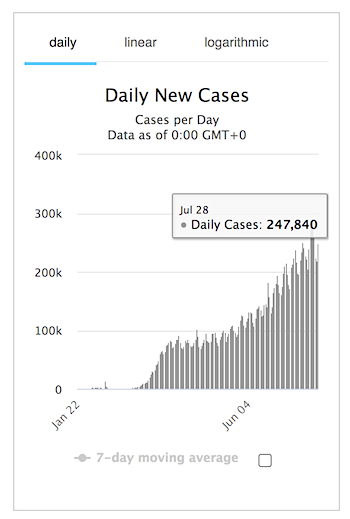
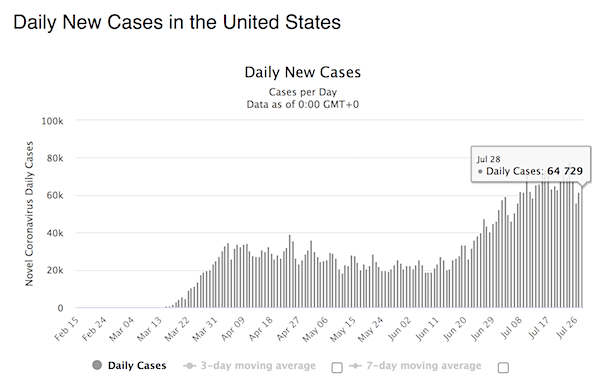
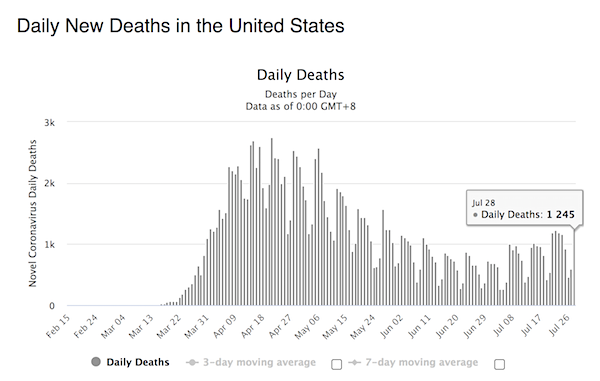

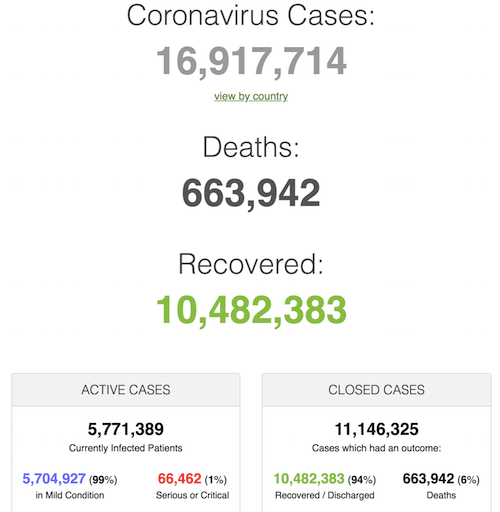

I have the same problem as Ben Hunt. Very much so.
Every time I tweet about Covid, I lose about 100 followers. People really don’t want to hear about Covid anymore. They’re sick of it, and they hate anyone who reminds them of it.
I get it.
But the virus doesn’t care about your feelings.
Stay safe. Act safe. Now more than ever.
— Ben Hunt (@EpsilonTheory) July 29, 2020

Byron York
Democratic Rep. Greg Stanton speaking to Attorney General Bill Barr, in a line that sums up today's Judiciary Committee appearance: 'You'll have a chance to comment after your testimony is over today.'
— Byron York (@ByronYork) July 28, 2020

Not seasonal. That took only 7 months.
• Coronavirus To Spread In One Big Wave and Won’t Go Away – WHO (RT)
The World Health Organization (WHO) has quashed hopes that the coronavirus might simply disappear over the summer. It urged the world to instead brace itself for “one big wave” of infections. WHO spokesperson Margaret Harris told reporters via conference call that, contrary to some expectations, the coronavirus will not wane during warmer seasons like the flu would. People are still thinking about seasons. What we all need to get our heads around is this is a new virus and… this one is behaving differently. Harris warned that there will be “one big wave” of coronavirus infections that will “go up and down a bit,” instead of several distinct waves one after another. “The best thing is to flatten it and turn it into just something lapping at your feet,” she said.
Many European countries have been gradually lifting or relaxing their quarantine restrictions since May. Because there is still no vaccine, the governments are calibrating their Covid-19 response while bracing for a potential second wave of the infection. Asian countries, like China and South Korea, as well as several US states were forced to re-impose some of the lockdown measures after infection rates went up again and new coronavirus hotspots were discovered. Harris reiterated the call to slow the spread of the virus by avoiding mass gatherings. This has proven to be challenging in recent months due to recurring large-scale anti-racism and police brutality protests in a number of Western countries.

Here’s looking at you, Jacinda Ardern?!
• WHO Says Keeping Borders Shut To Thwart COVID-19 Not “Sustainable” (CBS)
Keeping borders closed to halt the spread of COVID-19 is unsustainable, the World Health Organization said Monday, urging countries to adopt comprehensive strategies based on local knowledge of where the virus is spreading. Border closures and travel restrictions remain an important part of many countries’ strategy to combat the novel coronavirus. At the same time, rising cases in a range of countries in Europe and elsewhere that had loosened measures after appearing to get their outbreaks under control have spurred discussions of possible fresh border closures. But the UN health body warned that such measures cannot be kept up indefinitely, and are also only useful when combined with a wide range of other measures to detect and break chains of transmission.
“Continuing to keep international borders sealed is not necessarily a sustainable strategy for the world’s economy, for the world’s poor, or for anybody else,” Michael Ryan, WHO emergencies director, told journalists in a virtual briefing. “It is going to be almost impossible for individual countries to keep their borders shut for the foreseeable future,” he said, pointing out that “economies have to open up, people have to work, trade has to resume.” He acknowledged that when it comes to COVID-19, it is impossible to have a “global one size fits all policy” because outbreaks are developing differently in different countries. While countries with rampant community transmission may need to use the blunt instrument of lockdowns to gain control of the situation, others should be burrowing down to get a clear overview of where and how the virus is spreading at a local level.
They should be prepared to tighten or loosen measures accordingly, he said, warning against “releasing pressure” on the virus, which has killed some 650,000 people and infected 16.3 million worldwide.”Release pressure on the virus and the numbers can creep back up.” Maria Van Kerkhove, the WHO’s technical lead on COVID-19, said that instead of expecting drastic measures to keep the virus in check, people need to adapt their behaviours for the long haul. “What we’re going to have to figure out… is what our new normal looks like?” she told reporters. “Our new normal includes physical distancing from others, (and) wearing masks where appropriate,” she said. “Our new normal includes us knowing where this virus is each and every day, where we live, where we work, where we want to travel.”

Wonder what the situation will be in one week, two weeks.
• Six US States See Record COVID19 Deaths, Latinos Hit Hard In California (R.)
A half-dozen U.S. states in the South and West reported one-day records for coronavirus deaths on Tuesday and cases in Texas passed the 400,000 mark as California health officials said Latinos made up more than half its cases. Arkansas, California, Florida, Montana, Oregon and Texas each reported record spikes in fatalities. In the United States more than 1,300 lives were lost nation wide on Tuesday, the biggest one-day increase since May, according to a Reuters tally. California health officials said Latinos, who make up just over a third of the most populous U.S. state, account for 56% of COVID-19 infections and 46% of deaths. Cases are soaring in the Central Valley agricultural region, with its heavily Latino population, overwhelming hospitals. The state on Tuesday reported 171 deaths.
Florida saw 191 coronavirus deaths in the prior 24 hours, the state health department said. Texas added more than 6,000 new cases on Monday, pushing its total to 401,477, according to a Reuters tally. Only three other states – California, Florida and New York – have more than 400,000 total cases. The four are the most populous U.S. states. California and Texas both reported decreases in overall hospitalizations as Dr. Anthony Fauci, a top U.S. infectious diseases expert, saw signs the surge could be peaking in the South and West while other areas were on the cusp of new outbreaks. Fauci said early indications showed the percentage of positive coronavirus tests rising in Ohio, Indiana, Tennessee and Kentucky.

Panic over low numbers.
• Hong Kong Warns City On Verge Of Large Coronavirus Outbreak (R.)
Hong Kong leader Carrie Lam has warned the city is on the brink of a large-scale outbreak of the coronavirus and urged people to stay indoors as much as possible as strict new measures to curb the disease’s spread take effect on Wednesday. The new regulations ban gatherings of more than two people, close dining in restaurants and make the wearing of face masks mandatory in public places, including outdoors. These are the toughest measures introduced in the city since the outbreak. The government has also tightened testing and quarantine arrangements for sea and air crew members, effective on Wednesday.
“We are on the verge of a large-scale community outbreak, which may lead to a collapse of our hospital system and cost lives, especially of the elderly,” Lam said in a statement late on Tuesday. “In order to protect our loved ones, our healthcare staff and Hong Kong, I appeal to you to follow strictly the social distancing measures and stay at home as far as possible.” The new measures, which will be in place for at least seven days, were announced on Monday after the global financial hub saw a spike in locally transmitted cases over the past three weeks. On Tuesday, Hong Kong reported 106 new coronavirus cases, including 98 that were locally transmitted. Since late January, more than 2,880 people have been infected in the former British colony, 23 of whom have died.

Imports of vast quantities of oil that was bought in April means China’s buying a whole lot less now. And their storage is rapidly filling up.
• China’s Surging Crude Imports Mask Weakness In The Rest Of Asia (R.)
The ongoing flood of crude oil into China is obscuring the fact that demand in the rest of Asia remains weak, and that countries in the world’s top-consuming region didn’t join China is stocking up when prices slumped. China’s crude imports set consecutive records in May and June, and will remain at high levels in July and likely August too, as the massive volumes of oil bought during a brief price war in April enter the country. China imported 12.9 million barrels per day (bpd) in June, eclipsing the prior all-time high of 11.3 million bpd in May, according to official data. Imports for July may set a new record high, with Refinitiv Oil Research estimating 13.04 million bpd will be offloaded in the month.
Tracking China’s imports has been made more tricky by the sheer volume of tankers heading to, or waiting at, ports. Delays in discharging cargoes mean that August’s figures may get a bit of a boost from the earlier buying spree. Crude prices plunged to the lowest in 17 years in late April after Saudi Arabia and Russia, the leading producers in the group known as OPEC+, disagreed on whether to extend and deepen output cuts in a bid to support prices. The Saudis said they would sell as much oil as they could, and the sheer volume of oil being made available, coupled with the economic hit from the spreading novel coronavirus pandemic, saw benchmark Brent futures drop as low as $15.98 a barrel on April 22, some 78% down from this year’s peak of $71.75 in early January.
While the price war didn’t persist, with OPEC+ agreeing to extend and deepen output cuts, it did last long enough to give refiners an opportunity to stock up with bargain-basement crude. However, it appears that only Chinese refiners took up the offer, and perhaps trading houses with access to storage tanks, with many Asian buyers apparently more worried about the demand hit from the coronavirus than they were tempted by the low crude prices.

OPEC, the whole structure of it, is not made for downsizing. It won’t survive it.
• OPEC Prepares For An Age Of Dwindling Demand (R.)
The coronavirus crisis may have triggered the long-anticipated tipping point in oil demand and it is focusing minds in OPEC. The pandemic drove down daily crude consumption by as much as a third earlier this year, at a time when the rise of electric vehicles and a shift to renewable energy sources were already prompting downward revisions in forecasts for long-term oil demand. It has prompted some officials in the Organization of the Petroleum Exporting Countries, oil’s most powerful proponent since it was founded 60 years ago, to ask whether this year’s dramatic demand destruction heralds a permanent shift and how best to manage supplies if the age of oil is drawing to a close.
“People are waking up to a new reality and trying to work their heads around it all,” an industry source close to OPEC told Reuters, adding the “possibility exists in the minds of all the key players” that consumption might never fully recover. Reuters interviewed seven current and former officials or other sources involved in OPEC, most of whom asked not to be named. They said this year’s crisis that sent oil below $16 a barrel had prompted OPEC and its 13 members to question long-held views on the demand growth outlook. Just 12 years ago, OPEC states were flush with cash when oil peaked above $145 a barrel as demand surged. Now it faces a dramatic adjustment if consumption starts a permanent decline. The group will need to manage even more closely its cooperation with other producers, such as Russia, to maximise falling revenues and will have to work to ensure relations inside the group are not frayed by any fratricidal dash to defend market share in a shrinking businesses.
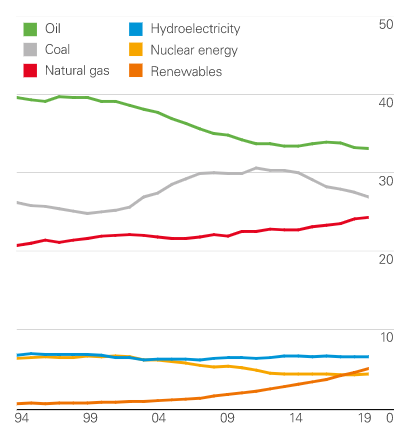

Their only real line is they compete with each other.
Nothing will happen, though, because they all work with and for US intelligence.
• Big Tech CEOs To Defend Their Companies By Listing Competitors (R.)
The chief executives of four of the world’s largest tech companies, Amazon.com, Facebook, Apple and Alphabet’s Google , plan to argue in a congressional hearing on antitrust on Wednesday that they face intense competition from each other and from other rivals. The testimony from Amazon’s Jeff Bezos, Facebook’s Mark Zuckerberg, Google’s Sundar Pichai and Apple’s Tim Cook, which was released Tuesday, portrays four chief executives who are looking over their shoulders at competitors who could render them obsolete. Pichai argued that search – which Google dominates by most metrics – was broader than just typing a query into Google, and said he remained concerned about being relevant as people turn to Twitter, Pinterest or other websites for information.
“We know Google’s continued success is not guaranteed. Google operates in highly competitive and dynamic global markets, in which prices are free or falling, and products are constantly improving,” Pichai said in the prepared remarks. The four will testify reut.rs/2DhrEFT to a panel of lawmakers investigating how their business practices and data gathering have hurt smaller rivals as they seek to retain their dominance, or expand. In his remarks, Bezos said Amazon occupies a small share of the overall retail market and competes with retailers like Walmart (WMT.N), which is twice its size. He also said the coronavirus pandemic boosted e-commerce businesses across the spectrum and not just Amazon.
Bezos also lays out how small sellers have succeeded on Amazon’s third-party marketplace, a practice that has come under scrutiny from lawmakers. In his prepared testimony, Zuckerberg argued that Facebook competes against other companies appearing at the hearing and against others globally. Zuckerberg will also defend Facebook’s acquisitions by saying the social media platform helped companies like WhatsApp and Instagram grow. Both are owned by Facebook. He will also remind lawmakers of the competitive threat U.S. tech companies face from China, saying that China is building its “own version of the internet focused on very different ideas, and they are exporting their vision to other countries.”

Investing in bankrupt companies. Thanks, Jay Powell.
• “People Have Too Much Money To Play With” (BBG)
The warning to shareholders of newly bankrupt Ascena Retail Group Inc. could hardly have been more direct. There it is, in black-and-white, on page 5 of the court declaration filed by Ascena’s most senior official just hours into the case: “Existing common equity in Ascena will be canceled.” Full stop. Creditors will take ownership of the retail chain, which Ascena also made plain. So how did stock investors respond? By bidding up the shares just shy of 120%, on off-the-charts volume. It was a similar story for bankrupt Global Eagle Entertainment Inc. The airborne Wi-Fi service jumped more than 50% on July 24 after its court filing, despite warning shareholders earlier in July that they stood to lose everything to creditors in a Chapter 11 case.
And it hearkens back to Hertz Global Holdings Inc., whose stock became Example A of post-bankruptcy rallies. The persistent mania for busted companies baffles financial advisers. “What’s going on here? I really couldn’t tell you; it’s not something I would ever recommend to anyone,” said George Gagliardi at Coromandel Wealth Management in Lexington, Massachusetts. “People have too much money to play with,” said Dennis Nolte, an adviser at Florida’s Seacoast Investment Services. “Most of these traders won’t be around when the bankruptcy proceedings are complete. Just turn the light off when you leave the room, if the lights aren’t turned off by the utility company because there’s no money to pay the bill.”

Bet you didn’t think the Council on Foreign Relations would come with this.
• It Is Time to Abandon Dollar Hegemony (Foriegn Affairs)
In the 1960s, French Finance Minister Valéry Giscard d’Estaing complained that the dominance of the U.S. dollar gave the United States an “exorbitant privilege” to borrow cheaply from the rest of the world and live beyond its means. U.S. allies and adversaries alike have often echoed the gripe since. But the exorbitant privilege also entails exorbitant burdens that weigh on U.S. trade competitiveness and employment and that are likely to grow heavier and more destabilizing as the United States’ share of the global economy shrinks. The benefits of dollar primacy accrue mainly to financial institutions and big businesses, but the costs are generally borne by workers.
For this reason, continued dollar hegemony threatens to deepen inequality as well as political polarization in the United States. Dollar hegemony isn’t foreordained. For years, analysts have warned that China and other powers might decide to abandon the dollar and diversify their currency reserves for economic or strategic reasons. To date, there is little reason to think that global demand for dollars is drying up. But there is another way the United States could lose its status as issuer of the world’s dominant reserve currency: it could voluntarily abandon dollar hegemony because the domestic economic and political costs have grown too high.
The United States has already abandoned multilateral and security commitments during the administration of President Donald Trump—prompting international relations scholars to debate whether the country is abandoning hegemony in a broader strategic sense. The United States could abandon its commitment to dollar hegemony in a similar way: even if much of the rest of the world wants the United States to maintain the dollar’s role as a reserve currency—just as much of the world wants the United States to continue to provide security—Washington could decide that it can no longer afford to do so. It is an idea that has received surprisingly little discussion in policy circles, but it could benefit the United States and ultimately, the rest of the world.
The dollar’s dominance stems from the demand for it around the world. Foreign capital flows into the United States because it is a safe place to put money and because there are few other alternatives. These capital inflows dwarf those needed to finance trade many times over, and they cause the United States to run a large current account deficit. In other words, the United States is not so much living beyond its means as accommodating the world’s excess capital. Dollar hegemony also has domestic distributional consequences—that is, it creates winners and losers within the United States. The main winners are the banks that act as the intermediaries and recipients of the capital inflows and that exercise excessive influence over U.S economic policy. The losers are the manufacturers and the workers they employ. Demand for the dollar pushes up its value, which makes U.S. exports more expensive and curtails demand for them abroad, thus leading to earnings and job losses in manufacturing.

Treason sounds big, any charge in that direction would suffice. Problem is, they have only 3 months left.
• DOJ Could Pursue Treason Charges Over Russia Probe Misconduct – Steube (JTN)
Rep. Greg Steube, R-Fla., sharply rebuked the FBI and suggested that the Department of Justice could potentially pursue charges of treason in connection with conduct related to the Trump-Russia investigation. “If it’s not clear to you now, it should be abundantly clear when these indictments start coming out for individuals involved in this through the Durham probe, that … this was a politicized, weaponized FBI at the highest level that was solely trying to take down a presidential campaign and then an incumbent president once he got sworn in—and that should scare every American,” Steube said during an interview with the John Solomon Reports podcast.
The Florida Republican, an Army veteran who has worked as an Airborne Infantry Officer and JAG Corps Officer, said that he believes “the level to which this agency and these individuals were trying to thwart an incoming president, to me, is treasonous.” The congressman believes the DOJ should be able to pursue charges of lying to Congress—he also said that there should be consequences for “misrepresentations” before the Foreign Intelligence Surveillance Court. Steube said that the FBI’s reputation has been severely damaged. “We’re not talking about individual agents operating in field offices across the country. We’re talking about the leadership of the FBI operating the FBI in a way that they’re deceiving the FISA Court, that they’re surveilling on American citizens for political purposes. And it completely discredited an agency that was once esteemed throughout law enforcement,” the congressman noted.

First reaction: yes, sure, gag the victims.
Ironically, though, if the material IS widely distributed it may help Maxwell in trying to have the case thrown out.
• Ghislaine Maxwell Fights To Keep Nude Photos And Sexualised Videos Secret (RT)
British socialite Ghislaine Maxwell, accused of grooming underage girls for pedophile Jeffrey Epstein, has requested a gag order against prosecutors to keep evidence including naked photos and ‘sexualised’ videos private. Maxwell, 58, was arrested earlier in July and is scheduled to be tried for sex-trafficking offenses in a Manhattan federal court in July next year. She has pleaded not guilty to charges that she’d groomed and aided the abuse by Epstein of at least three girls throughout the 1990s. Court documents show that Maxwell’s lawyers want to keep the evidence, which they describe as “highly confidential information” and including “nude, partially-nude, or otherwise sexualised images, videos or depictions of individuals” private, to prevent it appearing online and potentially impacting a series of civil lawsuits leveled against her by survivors of Epstein’s abuse.
“There is a substantial concern that these individuals will seek to use discovery materials to support their civil cases and future public statements,” Maxwell’s attorney Christian Everdell, the prosecutor who brought Mexican drug cartel kingpin Joaquin “El Chapo” Guzman to justice, explained. The proposed order, submitted Monday, is somewhat routine in sex-abuse cases but prosecutors have refused the request that witnesses and lawyers in the trial would be subject to any gag orders, and are expected to reply officially later on Tuesday. “The defense believes that potential government witnesses and their counsel should be subject to the same restrictions as the defense concerning appropriate use of the discovery materials – namely, if these individuals are given access to discovery materials during trial preparation, they may not use those materials for any purpose other than preparing for trial in the criminal case, and may not post those materials on the Internet,” the affidavit said.

Two cases came before a court on the 27th. One on London, and one in Madrid. Spying on clients and their attorneys, spying on a president, it should be enough to have the entire case vs Assange thrown out.
• Assange Spied On Like ‘In A Film,’ Lawyer Says (Rap)
WikiLeaks founder Julian Assange was spied on while holed up in the Ecuadorian embassy in London like “in a film,” his lawyer Baltasar Garzon said Monday, July 27, after testifying at a top Spanish court probing the allegations. Assange, who is in a British prison after being removed from the embassy last year, filed a lawsuit against private Spanish security firm Undercover Global, accusing it of spying on him and passing the information to the United States. The company was in charge of providing security at the embassy during the bulk of the seven years which the 49-year-old Australian spent inside the building.
Garzon, a prominent former Spanish judge, said he had seen images taken inside of the embassy of Assange talking to his lawyers which were allegedly recorded by the company. “This is scandalous, we think this only happens in spy movies but this is not a spy movie because someone’s life is at stake,” he told reporters after testifying at Spain’s National Court in Madrid. Assange has accused the firm of gathering information on him through video cameras and hidden microphones, copying identity documents and monitoring visitors’ mobile phones, and then passing the information to the US intelligence services. The lawsuit is key to Assange’s efforts to fight an extradition request by the US Justice Department which wants to put him on trial for leaking hundreds of thousands of secret US military and diplomatic documents in 2010.
Garzon said Assange’s legal team has provided British courts with information about the alleged spying because it has “a direct impact on the extradition and shows, in our view, that Julian Assange was the target of political persecution.” Assange’s extradition hearing will take place on September 7. Spain’s National Court in June opened an investigation into a complaint by Ecuador’s ex-president Rafael Correa that Undercover Global also spied on him. Correa accuses the firm, which provided him with security services until 2019, of “monitoring and taking photos” of his meetings with Garzon, who made global headlines in 1998 when former Chilean dictator Augusto Pinochet was arrested in London.

The law has been rendered meaningless. Therefore, so have the courts that are tasked with upholding it. That is not a trifle matter.
• It’s Not Assange Who Should Be Facing Prosecution (Can.)
On 27 July two court hearings took place – one in the UK, the other in Spain. Both concerned WikiLeaks founder Julian Assange. From their proceedings, it became clear that it’s not Assange who should be facing prosecution, but the current office holder of the US presidency and his associates. At the 27 July ‘administrative hearing’ at Westminster magistrates court, Judge Vanessa Baraitser stated that the prosecution had failed to present its latest ‘superseding indictment‘. That superseding indictment was first made public on 24 June, just prior to the last court hearing, though the prosecution failed to submit the document to that hearing too. Defence lawyer Edward Fitzgerald made it clear to the court that he was concerned the prosecution might still try to present the superseding indictment later, so as to delay the extradition hearings. He argued:
“We are concerned about a fresh request being made at this stage with the potential consequence of derailing proceedings and that the US attorney-general is doing this for political reasons.” Indeed, prosecution barrister Joel Smith refused to comply with any timeline to serve the superseding indictment. However, Baraitser told Smith that the deadline to submit the superseding indictment had passed. Controversially, the superseding indictment provided testimony from known (but unnamed) FBI informants, both of whom have criminal convictions and were engaged in entrapment operations. So perhaps it’s not surprising that the prosecution did not formally present a copy of the superseding indictment to the court. What the judge did not address, however, is that by publishing the superseding indictment on the internet, the US department of justice may have prejudiced the case against Assange – and that could be grounds for dismissal of all charges.
Meanwhile in Spain, the prosecution of David Morales, who is charged with organising the surveillance of the Ecuadorian embassy in London, proceeds, with testimony from former Spanish judge Baltasar Garzón, who is representing Assange. Morales, via his company UC Global, is also accused of providing that surveillance to US intelligence services. Assange lawyer Geoffrey Robertson commented that the surveillance constituted a “serious crime in European law”. Also monitored were meetings between Assange and some of his other lawyers, including Melinda Taylor, Jennifer Robinson, and Garzón. Surveillance also included logging of visitors, such as Gareth Peirce, another of Assange’s lawyers, as well as a seven-hour session between Assange and his legal team on 19 June 2016.

We try to run the Automatic Earth on donations. Since ad revenue has collapsed, your support is now an integral part of the process.
Thank you.





Support the Automatic Earth in virustime.


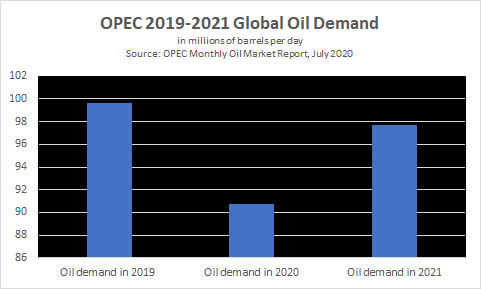






Home › Forums › Debt Rattle July 29 2020